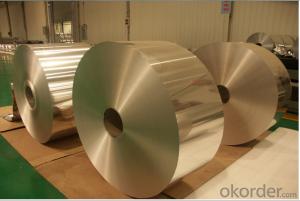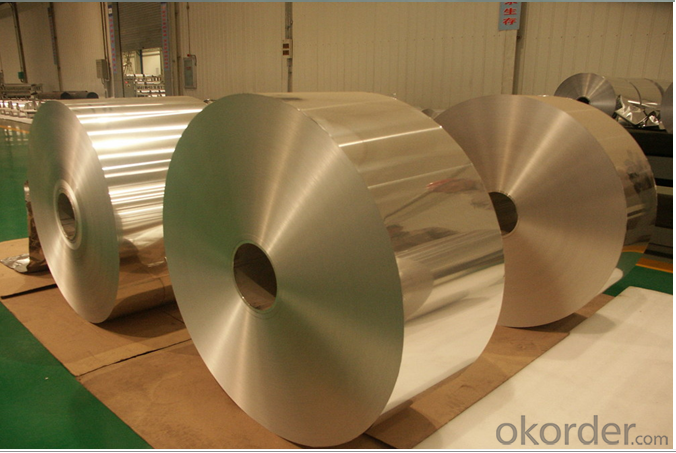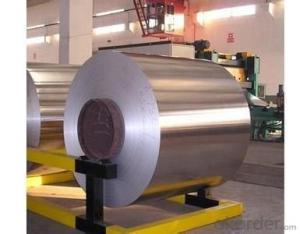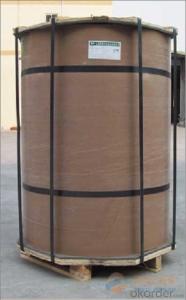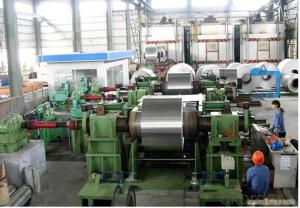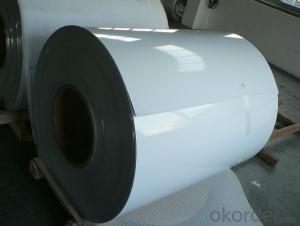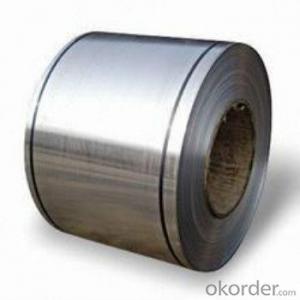Aluminum Coil Price for 1050 Temper Aluminium Coil with Good Quality
- Loading Port:
- China main port
- Payment Terms:
- TT OR LC
- Min Order Qty:
- 10 m.t.
- Supply Capability:
- 1000 m.t./month
OKorder Service Pledge
OKorder Financial Service
You Might Also Like
Specification
Description of Aluminium Coil
5000 series aluminium alloy sheet: 1050 aluminium alloy sheet are representative in the 5000 series of aluminium sheet. The 5000 series aluminium sheet is the more commonly used aluminum alloy sheet series, the main elements is magnesium, also it can be called Al-Mg alloy. The 5000 series aluminium alloy sheet main feature is low density, high tensile strength, high elongation, etc. In the same area under the weight of aluminum-magnesium alloy is lower than other series, so the 5000 series aluminium alloy sheet is often used in aviation, and it are also widely used in the conventional industry.
Alloy | Thickness(mm) | Width(mm) | Length(mm) | Temper | DC or CC | |
1050,1060,1070,1100, 1235 | 0.2-3.0 | 300-1850 | 1000-8000 | O,H12,H22,H14,H24,H16,H26,H18,H32 | DC, CC | |
3.0-150 | 900-1900 | H112,H111 | DC | |||
3003,3004,3105,3005 | 0.2-3.0 | 300-1850 | 1000-8000 | O,H12,H22,H14,H24,H16,H26,H18,H32 | DC, CC | |
3.0-150 | 900-1900 | H112,H111 | DC | |||
5052,5083,5754,5005 | 0.2-3.0 | 300-1850 | 1000-8000 | O,H12,H22,H14,H24,H16,H26,H18,H32,H36 | DC | |
3.0-150 | 900-1900 | H112, H111 | DC | |||
6061,6063 | 0.5-3.0 | 300-1500 | 1000-6000 | T6,T321 | DC, | |
The Main Features of Aluminium Coil:
High quality with competive prices.
Wide product range of choice.
We are specific manufacture and control.
The Images of Aluminium Coil:
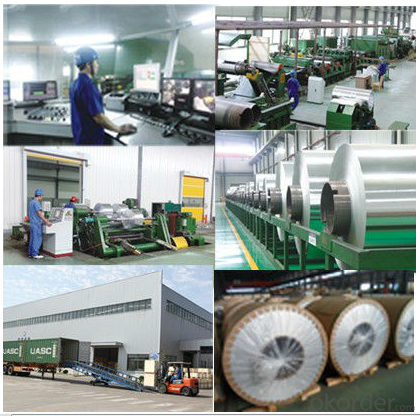
FAQ:
1. Minimum Order Quantity? MOQ is 25 tons, your quantity is ok, the aluminium foil sample is available. |
2. What kind of terms of payment? T/T, L/C,D/A,D/P,Western Union are available. |
3. What grams of the product can you offer? Our products can be customized according to your requirment |
4.Can you do Customization & Reproduction if I provide a photo? Yes, we do Customization & Reproduction service, please check the details and sample above. You need to send the pictures to our email, tell us the specification you want, then we will quote you exact price. We will take photos for you check. |
5. Does the packaging safe and arrive in good conditions? Yes, Safe Packing guarrantee, all the products will arrive your door under good conditions. We response to problem of shipping if there unfortunately is. |
6. How long does it usually take to deliver the product? We'll make the shipment to you immediately. It will take about 18 to 40 days arrive worldwide. Accurate delivery time depends on the specific quantity |
7.Is drop shipping abailable? Yes, it is, we can send to worldwide. |
- Q: What are the common alloys used in aluminum coil production?
- The common alloys used in aluminum coil production are 3003, 3105, 5052, and 6061.
- Q: Is it safe and practical to use aluminum coils in cooking processes?
- <p>Aluminum coils can be used for cooking, but with certain precautions. They are commonly used in commercial kitchens for their heat conductivity and durability. However, for home cooking, it's important to avoid acidic or alkaline foods, as aluminum can react with them. Additionally, prolonged exposure to heat can cause aluminum to leach into food, which some studies suggest may have health implications. It's advisable to use aluminum cookware with a protective coating or opt for alternative materials like stainless steel or cast iron for health-conscious cooking.</p>
- Q: Are there any limitations or restrictions on the use of aluminum coils?
- Yes, there are limitations and restrictions on the use of aluminum coils. Some of the main limitations include: 1. Corrosion: Aluminum is prone to corrosion, especially when it comes into contact with certain chemicals or environments. Therefore, it may not be suitable for applications where it will be exposed to corrosive substances or in highly corrosive environments. 2. Strength: While aluminum is a lightweight material, it is not as strong as other metals like steel. This can limit its use in applications that require high strength or load-bearing capabilities. 3. Temperature sensitivity: Aluminum has a lower melting point compared to other metals, which can be a limitation in applications where high temperatures are involved. It may not be suitable for use in certain industrial or high-temperature environments. 4. Electrical conductivity: While aluminum has good electrical conductivity, it is not as conductive as copper. This can limit its use in applications where high electrical conductivity is required, such as in electrical wiring or power transmission. 5. Cost: Aluminum can be more expensive than other metals, limiting its use in applications where cost is a significant factor. In such cases, alternative materials may be preferred. 6. Formability: Aluminum coils can be difficult to form or shape compared to some other metals. This limitation may restrict their use in applications where complex shapes or tight tolerances are required. It is important to consider these limitations and restrictions when selecting aluminum coils for a particular application. Careful evaluation of the specific requirements and constraints will help determine whether aluminum coils are suitable or if alternative materials should be considered.
- Q: The export of aluminum coil, according to steel coil declaration, will there be any problems?
- If you have already declared itCheck the corresponding HS code, to import countries taxes and fees are the same, whether the customer side mind?.China's tax rebate rate, you also see what kind of high?.In addition to export will have a steel coil sampling, aluminum volume difference is relatively large, so if the declaration, to take note of this, if the sampling try with conversational communication forwarding, otherwise it would be a big problem.
- Q: Is it possible to construct furniture or tables using aluminum coils?
- <p>Yes, aluminum coils can be used to make furniture or tables. Aluminum is a versatile material known for its strength, durability, and lightweight properties. It can be easily bent and shaped into various forms, making it suitable for furniture construction. Aluminum coils can be used to create the frame or support structure of tables and other furniture items. They are also resistant to corrosion and require minimal maintenance, making them a popular choice for outdoor furniture and modern interior designs.</p>
- Q: Can aluminum coils be used in power generation facilities?
- Yes, aluminum coils can be used in power generation facilities. Aluminum has excellent thermal conductivity, making it an efficient choice for heat transfer applications in power generation equipment such as heat exchangers and condensers. Additionally, aluminum's lightweight nature and corrosion resistance make it a viable option for various power generation processes, including wind turbines and hydroelectric power plants.
- Q: What are the different pre-treatment methods for aluminum coils?
- Some of the different pre-treatment methods for aluminum coils include cleaning, degreasing, etching, and phosphating. Cleaning removes dirt, dust, and other impurities from the surface of the coil. Degreasing eliminates oils and greases that may be present. Etching creates a rough surface on the aluminum, which helps in improving adhesion for subsequent coatings. Phosphating involves applying a phosphate coating to enhance corrosion resistance and improve paint adhesion. These pre-treatment methods ensure that the aluminum coils are properly prepared before any further processing or coating.
- Q: What are the common surface treatments for aluminum coils in the marine industry?
- In the marine industry, aluminum coils are commonly subjected to various surface treatments to enhance their durability and resistance to corrosion. Some of the most common surface treatments for aluminum coils in the marine industry include anodizing, powder coating, and chemical conversion coatings. Anodizing is a popular surface treatment method that involves the formation of a protective oxide layer on the aluminum surface through an electrolytic process. This oxide layer not only enhances the corrosion resistance of the aluminum coil but also provides it with improved abrasion resistance and an attractive appearance. Anodizing can be done in various colors, allowing for customization and aesthetic appeal. Powder coating is another widely used surface treatment for aluminum coils in the marine industry. It involves applying a dry powder to the aluminum surface, which is then cured under heat to create a durable and protective layer. Powder coating provides excellent resistance to UV rays, chemicals, and abrasion, making it a favorable choice for marine applications where exposure to harsh environmental conditions is common. Chemical conversion coatings are also commonly applied to aluminum coils in the marine industry. These coatings are formed through a chemical reaction between the aluminum surface and a solution containing specific chemicals. The resulting coating provides excellent corrosion resistance and acts as a barrier against moisture and other environmental factors. Chemical conversion coatings are often used as a pre-treatment before applying other coating systems to further enhance the aluminum coil's protective properties. Overall, the choice of surface treatment for aluminum coils in the marine industry depends on factors such as the intended application, environmental conditions, and desired aesthetics. Anodizing, powder coating, and chemical conversion coatings are among the most common options, each offering unique benefits to ensure the longevity and performance of aluminum coils in marine environments.
- Q: What are the typical dimensions for aluminum coils?
- <p>The standard size of aluminum coils can vary depending on the specific application and industry requirements. Commonly, aluminum coils are available in widths ranging from 600mm to 2000mm and thicknesses from 0.2mm to 6.0mm. The length of the coils can be from 500 meters to over 3000 meters, depending on the weight and the manufacturing process. It's important to note that these dimensions are not fixed and can be customized to meet specific project needs.</p>
- Q: This is not for around the house. It is for my lab. I am pretty sure these one wires are Aluminum, but I need the connector they were made with and the power cable is copper. Would it be okay to still try to join the two.
- They can be joined but only through a suitable device marked specifically for aluminum to copper connections. See website below.
Send your message to us
Aluminum Coil Price for 1050 Temper Aluminium Coil with Good Quality
- Loading Port:
- China main port
- Payment Terms:
- TT OR LC
- Min Order Qty:
- 10 m.t.
- Supply Capability:
- 1000 m.t./month
OKorder Service Pledge
OKorder Financial Service
Similar products
Hot products
Hot Searches
Related keywords
